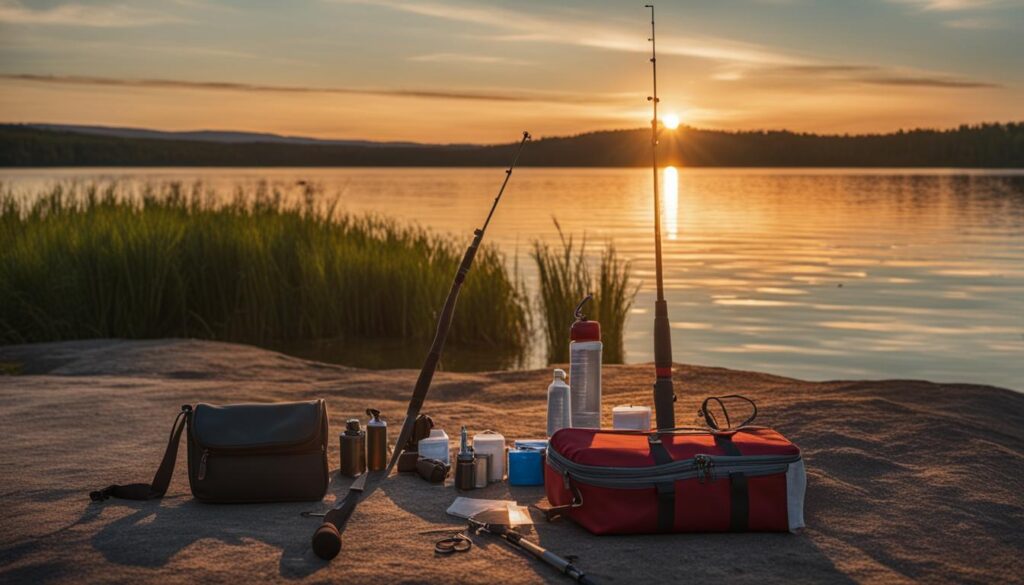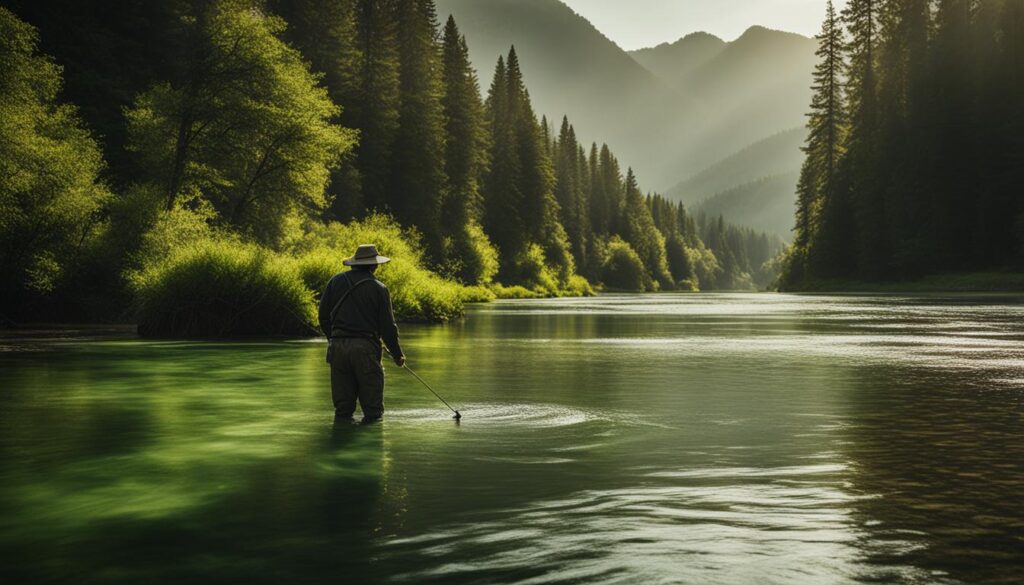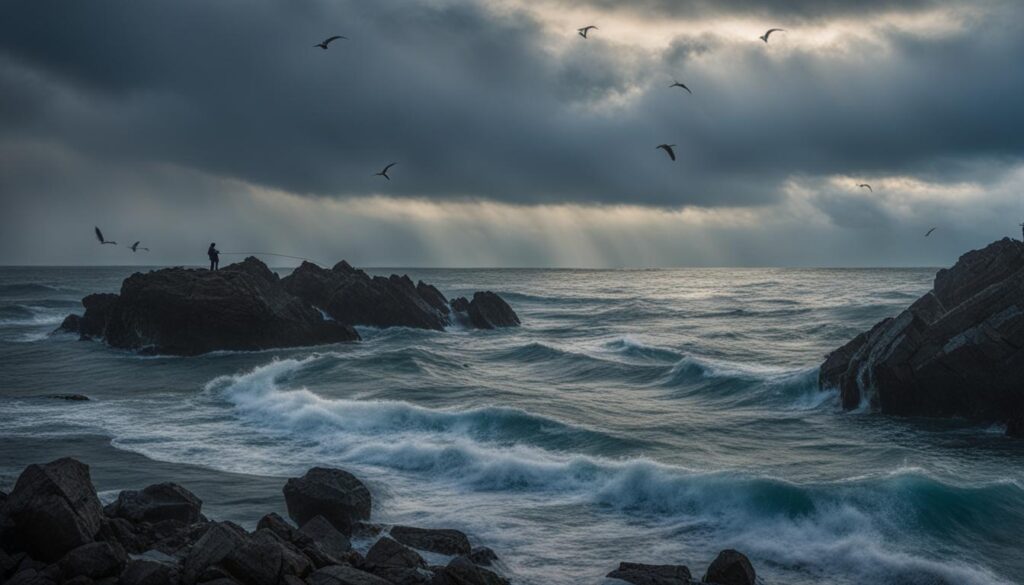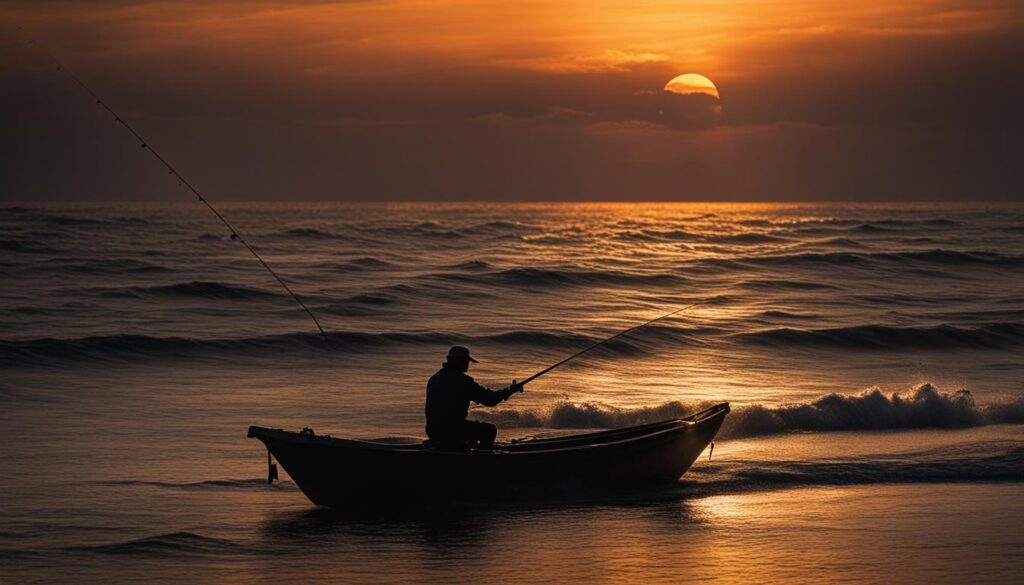We may earn money or products from the companies mentioned in this post.
Whether you’re an avid angler or just starting, fishing can be a great hobby and a fun way to enjoy the great outdoors. However, it’s important to prioritize your well-being and be prepared for any fishing-related emergencies. In this comprehensive guide, we will cover the essential practices for fishing first aid and safety, from important first aid tips to safety guidelines and emergency preparedness for anglers.
By following the guidelines and tips outlined in this guide, you can minimize the risks associated with angling and ensure a safe and enjoyable fishing experience.
Key Takeaways:
- Understand essential first aid tips for fishing emergencies.
- Follow fishing safety guidelines to minimize risks and prevent common accidents.
- Properly stock and maintain an essential first aid kit for fishing trips.
- Learn preventive measures to minimize the risk of injuries while angling.
- Be prepared for emergencies with essential emergency preparedness strategies for anglers.
First Aid Tips for Fishing
When you’re on a fishing trip, accidents can happen unexpectedly, and it’s vital to have some basic first aid knowledge at hand to administer prompt treatment and help reduce the severity of injuries. Here are some essential first aid tips for fishing:
Handling Fish Hook Injuries
One of the most common injuries during fishing is getting a fish hook embedded in your skin. If this happens, don’t panic. You should:
- Try to remove the hook immediately and preferably with a sterilized needle-nose plier or tool.
- Press down gently using one hand on the hook, and with the other hand, back the hook out in the same direction it went in.
- Wash the wound with clean water and give it a gentle squeeze to help drain any excess blood.
- Apply pressure to the wound with a clean cloth and cover it with a sterile bandage.
- If the wound is severe, seek medical attention immediately.
Remember, always use caution when handling fish hooks, and keep them out of reach of children.
Treating Cuts and Wounds
If you sustain cuts or wounds during fishing, you should:
- Stop the bleeding by applying pressure to the wound with a clean cloth.
- Clean the wound with soap and water, or an antiseptic wipe if available.
- Apply an antibiotic ointment to the wound to prevent infection.
- Cover the wound with a sterile bandage or dressing.
- If the cut is deep or gaping, or if you cannot stop the bleeding, seek medical attention immediately.
Wearing protective clothing such as gloves and using caution when handling hooks or sharp fishing gear can help prevent cuts and wounds.
Treating Burns
During fishing, you might accidentally get a burn from hot cooking gear or exposure to the sun. Here’s what you should do:
- Remove clothing or jewelry near the burned area.
- Cool the burn under cool running water for at least 20 minutes.
- Cover the burn with a sterile dressing or clean cloth.
- If the burn is severe or covers a large area, seek medical attention immediately.
It’s essential to wear proper clothing and sun protection such as hats and sunscreen to prevent sunburns.
Treating Eye Injuries
Eye injuries are not common during fishing, but they can occur, especially from loose fishing line or hooks. If you or someone else sustains an eye injury, take the following steps:
- DO NOT rub or touch the injured eye.
- Flush the eye with clean water or sterile saline solution if available.
- Cover the eye with a clean cloth or sterile dressing and seek medical attention immediately.
Wearing protective glasses or goggles while fishing can help prevent eye injuries.
Remember, basic first aid knowledge can help you provide prompt treatment, reduce the severity of injuries, and ensure a safe and enjoyable fishing trip.
Fishing Safety Guidelines
Fishing is a relaxing and enjoyable pastime, but it’s important to take the necessary safety precautions to avoid common fishing accidents. By following these fishing safety guidelines, you can minimize the risks associated with angling and ensure a safe and enjoyable experience.
Clothing and Footwear
Wearing appropriate clothing and footwear is essential when fishing. Dress in layers to accommodate changing weather conditions, and avoid wearing loose clothing or jewelry that could get caught in your equipment. Footwear should be comfortable and provide good traction, especially when fishing from rocky shores or wet surfaces.
Water Safety
When fishing near water, always wear a life jacket and keep a watchful eye on changing water conditions. Never fish alone, and avoid wading in unfamiliar areas. In case of an emergency, it’s important to know how to swim and to have a plan for calling for help.
Casting Safety
One of the most common fishing accidents is getting hooked by a fishing lure. To avoid this, always check your surroundings before casting and make sure there are no people or objects close by. Never cast directly over other people’s lines, and be aware of the wind direction to avoid getting tangled in trees or other obstacles.
Adverse Weather Conditions
Always check the weather forecast before heading out on a fishing trip, and be prepared for changing weather conditions. If a storm is approaching, seek shelter immediately and avoid fishing until the storm has passed. Never fish during thunderstorms, as lightning poses a serious safety hazard.
Fishing Safety Tips
- Carry a fully stocked first aid kit and know how to administer basic first aid.
- Handle fish with care to avoid getting fins or spines lodged in your skin.
- Use barbless hooks to minimize injuries when releasing fish.
- Always handle knives and other sharp objects carefully and keep them stored safely when not in use.
- Stay hydrated and take frequent breaks to avoid exhaustion and overheating.
Essential First Aid Kit for Fishing
A well-stocked first aid kit is an essential part of any fishing trip. It can help you treat minor injuries and potentially provide life-saving aid in emergency situations. As you pack for your fishing trip, make sure you have the following items in your first aid kit:
| Item | Purpose |
|---|---|
| Adhesive bandages (various sizes) | To cover minor cuts and scrapes |
| Gauze pads and roll | To handle larger wounds and control bleeding |
| Antiseptic wipes | To clean wounds and prevent infection |
| Tweezers | To remove fish hooks and splinters |
| Scissors | To cut bandages and clothing if necessary |
| Pain relievers (acetaminophen, ibuprofen) | To alleviate pain and reduce inflammation |
| Antihistamines | To alleviate allergic reactions to insect bites and stings |
| Sunscreen | To protect against harmful UV rays |
| Emergency blanket | To keep warm in case of hypothermia |
| Emergency contact information | For quick access to emergency services and family or friends |
Additionally, ensure that you have any personal medications that you may require and that your kit is easily accessible during your fishing trip.
Remember to check and replenish your first aid kit before every fishing trip, and familiarize yourself with how to use each item in the kit.
Preventing Fishing Injuries
Prevention is key when it comes to fishing injuries. Taking proactive measures can significantly reduce the risk of accidents and injuries while angling. Here are some essential tips to keep in mind:
- Proper Fish Handling Techniques: When handling fish, avoid spiny fins and sharp teeth. Use gloves or towels to handle fish, and always release them back into the water as gently as possible.
- Safe Hook Removal Methods: Use pliers to gently remove hooks from fish or to free them from obstructions. If a hook is stuck in your skin, seek medical attention immediately.
- Casting Safety: Never cast your line near other people, and use caution when casting in windy conditions. Be aware of your surroundings and look out for obstacles or hazards that may impede your casting.
- Avoid Overexertion: Fishing can be physically demanding, especially if you’re fishing for extended periods in harsh conditions. Take regular breaks and stay hydrated to avoid exhaustion and dehydration.
- Proper Clothing: Wear appropriate clothing for the weather conditions, including a life jacket if you are fishing on a boat. Avoid wearing loose-fitting clothing that may get caught in your fishing gear or hinder your movement.
- Staying Aware of Your Surroundings: Be mindful of the water conditions, such as currents and tides, and avoid fishing during dangerous weather or at night. Keep an eye out for wildlife and other potential hazards.
Fishing Injury Statistics
According to the U.S. Coast Guard, over 320 people died and 4,000 were injured in fishing-related accidents in 2019 alone. The majority of these accidents were attributed to falls overboard, collisions, and other hazards associated with boating and watercraft activities. However, fishing injuries can also result from other causes, such as fish hook injuries, cuts, and bruises. By taking proactive measures to prevent injuries and being prepared to administer first aid when necessary, you can minimize the risks associated with fishing and enjoy your fishing adventures safely.
Emergency Preparedness for Anglers
Fishing is an enjoyable activity that provides ample opportunities for adventure. However, it’s essential to be prepared for emergencies that may occur while fishing. Here are some tips to help you get started on your emergency preparedness plan:
Create a Communication Plan
An essential aspect of emergency preparedness is to have a communication plan in place. Ensure that you have a fully charged mobile phone and that you have shared your location and trip details with someone who can raise the alarm if you fail to return on time. This person should know who to contact in case of emergency and have access to all the relevant information, including your medical information and emergency contact details.
Know How to Respond to Severe Weather Conditions or Medical Emergencies
It’s crucial to have a basic understanding of how to respond to severe weather conditions or medical emergencies. Know how to identify the signs of hypothermia, dehydration, heat exhaustion, and heatstroke. Carry appropriate clothing for the conditions, sufficient food and water, as well as any medications you may need. If you or someone in your group is injured, be prepared to administer first aid and know how to contact emergency services if necessary.
Understand CPR and Rescue Techniques
Knowing CPR and rescue techniques can make a significant difference in a life-threatening situation. It’s advisable to attend a first aid or CPR course to learn these valuable techniques. Additionally, it’s essential to carry a rescue knife and whistle with you at all times and know how to use them in case of an emergency.
Be Prepared for Other Emergencies
Other unlikely emergencies include boat accidents, getting lost, or encountering wildlife. Make sure that your boat carries enough safety equipment, including life jackets, flares, and emergency lights, and that you know how to use them. Always carry an up-to-date map and compass and know how to use them to navigate if you get lost. Securing your campsite properly, including stowing food properly, can minimize the risks of attracting unwanted wildlife.
By following these emergency preparedness tips for anglers, you can ensure a safe and enjoyable fishing trip. Remember always to prioritize your safety and well-being and be prepared for any unexpected events.
Conclusion
In conclusion, prioritizing fishing first aid and safety is vital for a successful and enjoyable fishing experience. With the knowledge and guidelines presented in this comprehensive guide, anglers of all levels can minimize the risks of potential injuries and be prepared for emergencies.
Remember to familiarize yourself with critical first aid tips, including how to handle fish hook injuries and treat cuts and wounds. Implement preventive measures to minimize the risk of injuries, such as proper fish handling techniques and casting safety. It’s also important to prepare a well-stocked first aid kit with all the necessary items.
Furthermore, emergency preparedness is another crucial aspect of fishing safety. Make sure to create a communication plan, understand how to respond to severe weather conditions or medical emergencies, and be familiar with CPR and rescue techniques.
By following all the guidelines and tips outlined in this article, you can ensure a safe and productive fishing trip. Prioritize your well-being, stay alert to potential hazards, and be prepared to provide first aid when necessary. With the right preparation and knowledge, you can make your fishing trips both enjoyable and safe.
FAQ
What should I do if I get a fish hook injury while fishing?
If you or someone else gets a fish hook injury, it’s important to stay calm. Do not try to remove the hook yourself, as this can cause further damage. Instead, seek medical attention as soon as possible. If you need to temporarily immobilize the hook, you can use a clean cloth or bandage to secure it in place.
How can I prevent slips and falls while fishing?
To prevent slips and falls while fishing, it’s important to wear appropriate footwear with good traction. Avoid uneven surfaces and be cautious when moving around wet or slippery areas. Take your time when walking and use handrails or other support if available. Maintaining a proper balance and being aware of your surroundings can greatly reduce the risk of falls.
What should I include in my fishing first aid kit?
Your fishing first aid kit should include essential items such as adhesive bandages, antiseptic wipes, gauze pads, adhesive tape, scissors, tweezers, pain relievers, and emergency contact information. It’s also a good idea to have a waterproof case or bag to protect your supplies from water damage. Make sure to regularly check and restock your first aid kit to keep it up to date.
How can I prevent overexertion while fishing?
To prevent overexertion while fishing, it’s important to know your limits and pace yourself. Take breaks when needed and stay hydrated. Avoid lifting or carrying heavy loads on your own and consider using proper equipment or asking for assistance when necessary. Listen to your body and take care of yourself to prevent unnecessary strain or fatigue.
What should I do in case of severe weather conditions while fishing?
If you encounter severe weather conditions while fishing, it’s important to prioritize your safety. Seek shelter immediately and move away from bodies of water. Avoid open areas, tall trees, and metal objects that can attract lightning. Stay updated on weather forecasts before heading out and be prepared to end your fishing trip early if necessary.
How can I create a communication plan for emergencies while fishing?
Creating a communication plan for emergencies while fishing is essential. Make sure to inform someone about your fishing plans, including the location, expected return time, and emergency contact information. Consider carrying a fully charged cell phone or a two-way radio for communication. Additionally, familiarize yourself with the local emergency services and their contact information.
Affiliate Disclosure: This post may contain affiliate links. If you purchase through our link, we may receive a small commission, but at no additional cost to you. For more information, please see our Disclosure statement.



